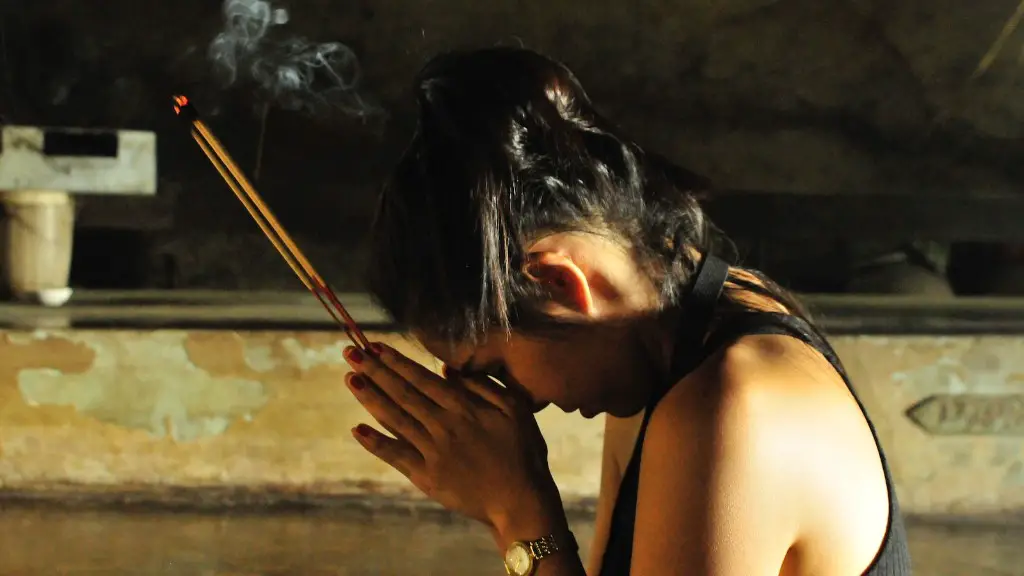Analysis Of The General Permission Of Christianity In Saudi Arabia
In Saudi Arabia, Islam is the general and state-sanctioned religion and other forms of religions are not allowed to practice their faith in public. Christianity, though tolerated to some extent, is not visible in Saudi Arabia. This article provides an in-depth analysis of how Christianity is being treated within the country, and how it compares to other Islamic-majority countries in the region.
According to the US Department of State, there is no freedom of religion in Saudi Arabia. The country, which is viewed as the birthplace of Islam, is ruled by a strict interpretation of Sharia Law. It is estimated that approximately 98 percent of the total population adheres to the Islamic faith. Churches and other places of Christian worship are forbidden, and those caught practicing Christianity publicly can face harsh punishments, such as fines and jail time. The government also has a long history of persecuting and repressing non-Muslims and non-conforming Muslims.
However, there is some evidence that suggests a degree of tolerance for Christianity within certain circles. Reports from the US Commission on International Religious Freedom indicate that in some areas, particularly in larger cities, small Christian services are allowed in private homes. Additionally, there have been several reports of members of the Christian community attending public events, such as concerts and art shows, and that the government has allowed temporary Christian exhibitions in art galleries, schools and universities.
Comparatively, some other countries in the region have more leniency in their laws regarding Christianity. For instance, both Israel and Jordan have enshrined their respective countries’ Christian heritage in their laws and public policies, allowing public displays of Christian symbols and events such as Christmas, Easter and various Christian holidays.
Despite the small steps being made, the open practice of Christianity in Saudi Arabia still remains questionable. The country’s strict interpretation of Islamic law would lead one to think that practicing Christianity openly would still be harshly persecuted. This is why, despite some reports of increased leniency and Christian events, many Christians still practice their faith secretly and in private homes.
Overall, although Christianity is not openly expressed in Saudi Arabia, there is still some leeway in certain circles in the country, particularly in larger cities. In comparison to other Islamic-majority countries in the region, Saudi Arabia has more restrictions on practicing Christianity, making it necessary for anyone wishing to follow the religion to keep it discreet, if not completely out of public view.
Government Policy Towards Christianity
Under both the basic law and other regulations, the government of Saudi Arabia places restrictions on public worship consistent with its interpretations of the Islamic faith. For example, there is a general prohibition against public worship from any other religion, in the presence of non-Muslims. As such, practicing Christianity in Saudi Arabia is an unlawful act under its laws. Despite this, the government does not generally prosecute or harass individuals for communicating their faith in privately-held gatherings as long as it remains private and is kept within the confines of their own homes.
Furthermore, the Saudi Arabian government allows foreign Christian expats to observe religious holidays, such as Christmas within their own homes. Similarly, many Christian foreign residents are allowed to travel outside the country to take part in specific religious observances and participate in other cultural and religious ceremonies.
In addition to the legal restrictions imposed upon Christians living in Saudi Arabia, there are also social restrictions in place. There is little to no tolerance for public displays of Christianity in Saudi Arabia. As such, Christians residing in the country must remain very discreet about their faith in public.
Overall, the government of Saudi Arabia has made some minor moves towards allowing public displays of religious beliefs, such as allowing foreigners to observe certain religious holidays. However, there has been no shift in the government’s strong stance against the open practice of Christianity in public.
Religious Freedom and the International Community
The international community has shown growing concern over the lack of religious freedom in Saudi Arabia.The United States, United Kingdom and Netherlands, to name a few, have all voiced their disapproval at the lack of religious freedom in the country.
In 2018, the United Nations also proposed a resolution to the Human Rights Council condemning the government of Saudi Arabia for its severe restrictions on religious freedom and harsh punishments for exercising their right to practice any other faith.
Many of these countries have gone as far as to call on the Saudi Arabian government to create a more tolerant environment for all religious minorities, specifically the Christian faith. They have also requested that the government take steps towards ensuring that the country’s laws and regulations adhere to international standards of religious freedom and tolerance.
Despite the increasing criticism, the government has not taken any major steps towards improving religious freedom, nor has it expressed any willingness to do so. As such, the international community has continued to call on the Saudi Arabian government to take further steps towards allowing its citizens the religious freedom that the international community believes to be an inalienable right.
Implications Of Religious Freedom On Political Dynamics
The lack of religious freedom in Saudi Arabia has implications beyond the legal and social boundaries of the country. The current state of religious freedom in Saudi Arabia has closely tied to the politics of the region. For example, the lack of religious tolerance in Saudi Arabia has been used to discredit the Saudi Arabian government in the eyes of other countries, leading to strained international relations.
Furthermore, many countries within the region have been criticized for not taking a stronger stance against Saudi Arabia’s continued persecution of religious minorities. This has created a divide between traditional allies, as countries such as Israel and the United Arab Emirates have appeared to align themselves more closely with Saudi Arabia at the expense of other countries with more liberal approaches to religious minorities.
Additionally, the lack of religious freedom in Saudi Arabia has consequences within the country itself. The lack of religious tolerance has impacted the country’s economic development, as businesses and investors are less likely to invest in a state that restricts religious freedoms. This has led to criticism of the Saudi Arabian government, claiming that it is hindering the development of its own economy.
Ultimately, the lack of religious freedom in Saudi Arabia has wide-reaching implications both on the local and international level. From strained international relationships to economic stagnation, the lack of religious freedom has had a ripple effect throughout the region.
Alternatives To The Status Quo
In order to move away from the current state of things in Saudi Arabia, the government must take serious steps towards allowing its citizens to practice their faith freely and without fear of retribution. This could come in the form of loosening restrictions on public religious practices, or allowing more non-Muslim religious institutions to exist. Such an overhaul of the current system could have numerous positive implications for the country, from increased economic growth to increased international relations.
Additionally, Saudi Arabia should strive to become a more tolerant society when it comes to religious minorities. This could come in the form of educational initiatives that promote tolerance and understanding, or increasing public dialogue on the issue. Doing so would allow Saudi citizens to not just tolerate, but embrace their differences and create an environment of acceptance and inclusivity.
Finally, the government of Saudi Arabia should work to ensure that its laws and regulations are in line with international standards of religious freedom. This would signal to the international community that Saudi Arabia is making an effort to protect its citizens’ human rights and in turn, lead to potentially more positive diplomatic ties with other countries in the region.
These are just some of the solutions that the government of Saudi Arabia could consider in order to create a more tolerant and open society when it comes to religious freedom. Doing so would not only benefit the citizens of the country, but lead to potentially positive ramifications on a local and international level.
Impact On Social Structures and Civil Society
The lack of religious freedom in Saudi Arabia has had an impact not just on the individual level, but also on the social and community level. Due to the repression of religious minorities, many members of these communities have been forced to practice their faith in secret, leading to a lack of unity within these groups.
Furthermore, the lack of religious freedoms has also had a direct impact on civil society, leading to increased tensions and hesitancy in forming social and religious organizations. Many people are fearful of speaking out against the government and engaging in religious practices, as they do not want to face potential persecution or retribution. This has led to a decrease in the formation of civil and religious organizations and a lessening of public discourse and discussion on the topic of religious freedoms.
In conclusion, the lack of religious freedom in Saudi Arabia has had far-reaching implications beyond the legal restrictions imposed on the country, impacting the individual, community, and even the international level. As such, the government must take serious and immediate steps towards allowing its citizens to practice their faith openly, and without fear of retribution. Doing so would have numerous positive ramifications on both the local and international level, and could lead to an improvement in both social and economic aspects of the country.


